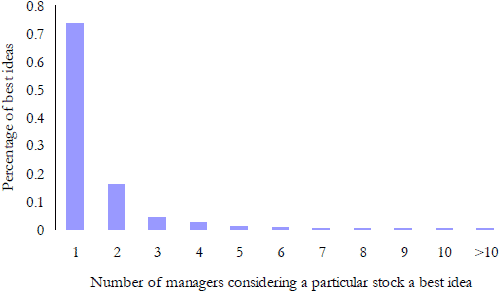How many stocks within an equity fund manager’s portfolio represent truly “passionate” (high-conviction) picks? Do passionate picks outperform the diversifying “fillers” in the portfolio, and the market in general? In the March 2009 version of their paper entitled “Best Ideas”, Randy Cohen, Christopher Polk, and Bernhard Silli attempt to identify which holdings in equity mutual fund portfolios represent the high-conviction “Best Ideas” of the fund managers and then measure the performance those stocks after the conviction becomes apparent. They identify high-conviction holdings via several measures that indicate unusually high commitment (tilt) of funds to specific stocks, with the “Best Idea” in a portfolio being the stock with the highest tilt. Using monthly stock returns and quarterly fund holdings data for U.S. equity mutual funds over the period 1991-2005, they conclude that:
- Best ideas are mostly unique to individual fund managers. Over the entire sample period, over 70% are best ideas of only one manager, 19% are best ideas of two managers and only 8% are best ideas of three managers at a time (see the chart below).
- A portfolio of stocks indicating the highest convictions across active equity fund managers outperforms the market, and other stocks held by those funds, by approximately 1% to 4% per quarter depending on benchmark, risk model and definition of conviction. Results for a limited selection of other high-conviction stocks (e.g., top five per fund) are also strong.
- Best ideas tend to be stocks of small growth firms with high beta, high volatility and recent strong returns (high momentum).
- The best of the best ideas tend to be:
- Fresh ideas (those with convictions most recently revealed).
- Least liquid.
- Least popular with other fund managers.
- Those from small or concentrated mutual funds.
- While investors would benefit if managers held more concentrated portfolios, the rules and incentives of the investment industry appear to encourage fund managers to diversify for reasons independent of alpha (especially via stocks with low return correlations relative to their best ideas).
The following chart, constructed from data in the paper, shows the percentages of best ideas held by one, two, three and more mutual fund managers during 1991-2005 at any given time. The best idea is the stock with the greatest (positive) difference between fund portfolio weight and market portfolio weight. The chart shows that nearly three quarters of best ideas are unique to a single fund manager.

In summary, evidence indicates that equity mutual fund managers can select stocks that deliver economically large risk-adjusted returns, but little of this alpha gets through to fund investors because of alpha-free incentives for fund managers to diversify. Individual investors may want to focus, independently, on stocks that fund managers have newly overweighted.
All results apparently exclude transaction costs and consideration of fund fees, which could affect some conclusions.